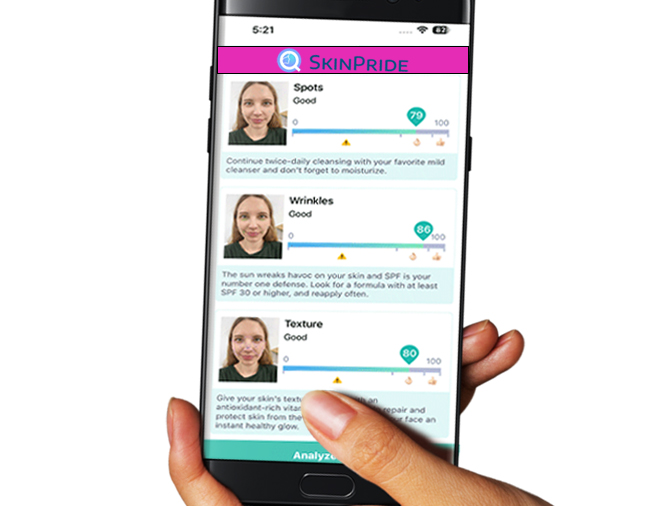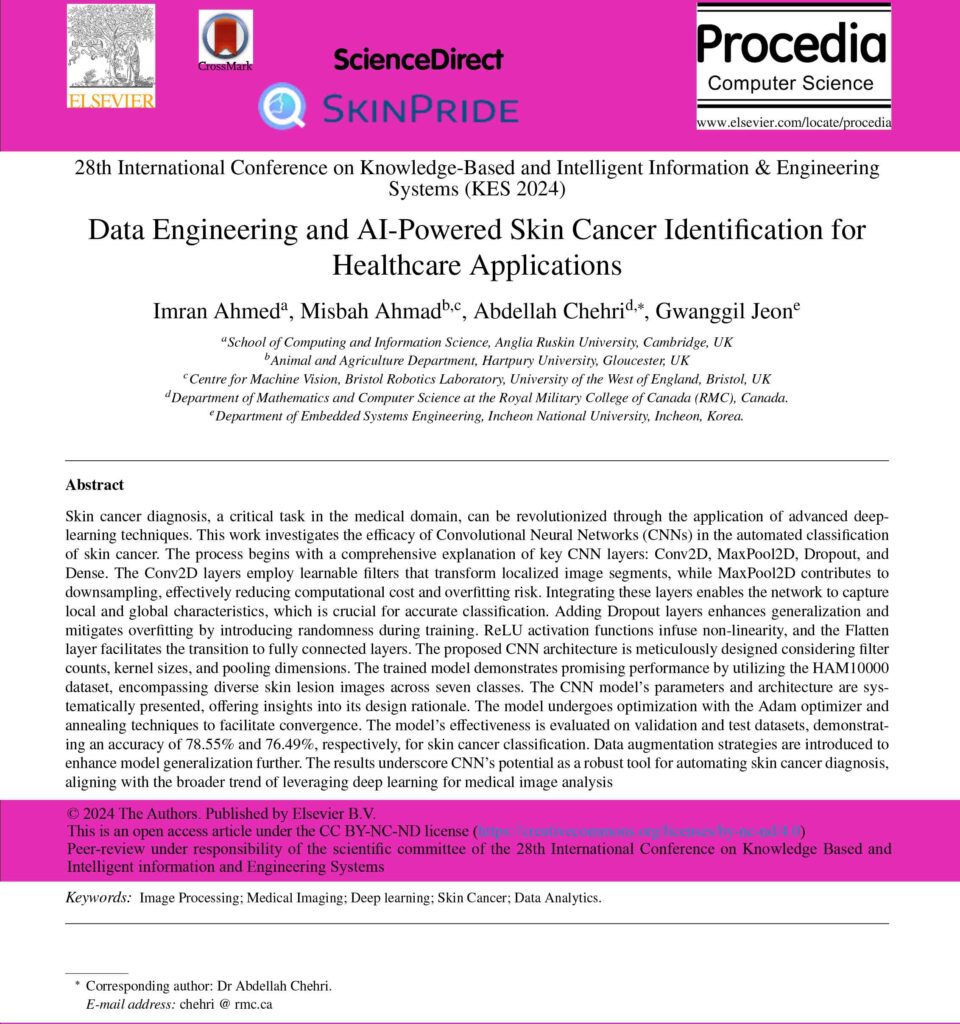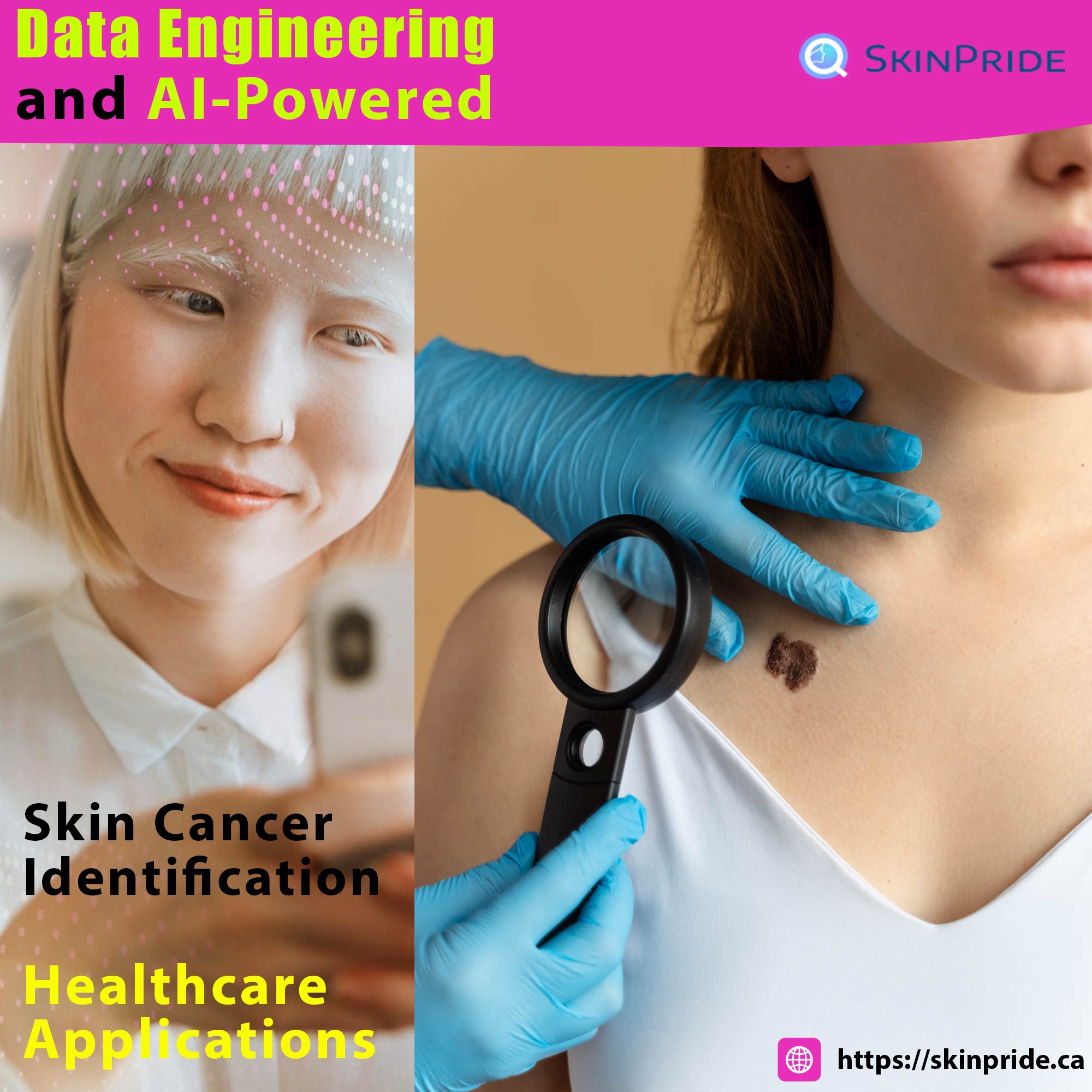Data Engineering and AI-Powered Skin Cancer Identification for Healthcare Applications
Introduction
Skin cancer is one of the most common types of cancer worldwide, with millions of cases diagnosed each year. Early detection of skin cancer is crucial for improving survival rates, making it essential for healthcare providers to adopt innovative technologies that can facilitate quicker and more accurate diagnoses. In recent years, data engineering and artificial intelligence (AI) have emerged as game-changers in the field of healthcare, particularly in skin cancer detection. AI-powered skin cancer identification apps, like SkinPride, are revolutionizing how we approach skin cancer screenings, making them more accessible, affordable, and efficient.
In 2024, advancements in data engineering and artificial intelligence (AI) are revolutionizing healthcare, with innovative applications in skin cancer detection. As the fight against skin cancer intensifies, AI-powered skin cancer identification tools are becoming essential in enhancing early diagnosis and improving patient outcomes. One such innovation is the SkinPride app, which leverages AI and machine learning algorithms to help identify skin cancer risk. In this article, we will explore the role of AI-powered apps like SkinPride in transforming healthcare, focusing on the potential benefits, technological advancements, and the future of skin cancer screening in Canada, particularly in major cities like Toronto.
Understanding Data Engineering in Healthcare
What is Data Engineering?
Data engineering is the process of designing and building systems to collect, store, and analyze vast amounts of data. In healthcare, this involves gathering medical data from various sources, including patient records, medical imaging, and genetic data, and transforming it into a usable format for analysis. The goal is to provide healthcare professionals with accurate and actionable insights that can enhance decision-making and improve patient outcomes.
How Data Engineering Supports AI in Healthcare
Data engineering provides the foundation for AI algorithms to learn and make predictions. Without well-structured data, AI models would be ineffective. In skin cancer detection, data engineers ensure that the images of skin lesions used by AI models are high-quality and diverse enough to train accurate models. The more comprehensive and diverse the data, the more effective the AI system will be at identifying potential skin cancer cases.
The Rise of AI and Data Engineering in Healthcare
The healthcare industry is increasingly adopting AI-driven technologies to improve diagnosis, patient care, and overall outcomes. Among these, AI-powered skin cancer identification has shown immense potential. Data engineering plays a pivotal role in processing vast amounts of medical data, such as images of skin lesions, to accurately identify signs of skin cancer. Machine learning algorithms are trained on these datasets to detect patterns that might be missed by the human eye, offering a faster and often more reliable means of diagnosis.
AI applications, such as the SkinPride app, are transforming how we approach early detection. The SkinPride app uses deep learning and computer vision to analyze images of skin lesions. These advanced algorithms help the app assess the likelihood of a skin lesion being cancerous, providing users with valuable insights and prompting them to seek professional medical consultation if necessary.
AI-Powered Skin Cancer Detection: An Overview
How AI Detects Skin Cancer
AI detects skin cancer by analyzing images of skin lesions, looking for visual signs of cancerous growths. The system compares these images to a database of known cases, identifying patterns associated with melanoma, basal cell carcinoma, and squamous cell carcinoma. The AI model can then predict the likelihood of a lesion being cancerous, allowing users to take appropriate action.
The Role of Computer Vision and Deep Learning
Computer vision is a subset of AI that focuses on enabling computers to interpret and understand visual information. In the case of skin cancer detection, computer vision algorithms analyze images of skin lesions to identify abnormalities that might indicate cancer. Deep learning takes this a step further by using neural networks to understand complex patterns in these images.
Benefits of AI-Powered Skin Cancer Identification
One of the most significant advantages of using an AI-powered app like SkinPride is its accessibility. Users in remote areas, or those unable to visit a dermatologist regularly, can benefit from early warnings, which can lead to quicker action and improved outcomes.
While professional dermatological consultations can be costly, especially in areas like Toronto, SkinPride provides an affordable alternative. It helps bridge the gap between initial screenings and professional diagnoses.
AI algorithms can analyze skin lesions in a fraction of the time it would take for a human dermatologist. This rapid analysis allows for quicker decision-making and less waiting time for patients.
For many individuals, privacy is a significant concern when it comes to medical diagnoses. With the SkinPride app, users can remain anonymous while still receiving valuable insights, which is especially important for people with medical mistrust or privacy concerns.
Ingredients like retinol, hyaluronic acid, and antioxidants are known for their anti-aging properties. It’s important to choose products that suit your skin type and concerns.
The SkinPride App: Revolutionizing Skin Cancer Detection
How SkinPride App Uses AI to Detect Skin Cancer
SkinPride is an AI-powered mobile app that uses machine learning and computer vision to analyze images of skin lesions and assess the likelihood of skin cancer. Designed to be accessible and easy to use, SkinPride provides an initial screening tool for users, helping them make informed decisions about whether to consult a dermatologist.
SkinPride combines machine learning and AI technologies to identify and evaluate suspicious skin lesions. The process is simple and accessible:
Features and Functionality of the SkinPride App
The app allows users to take high-quality photos of their skin lesions and upload them for analysis. The AI algorithms then analyze the images, providing users with a report on the potential risk of cancer. If the app detects a suspicious lesion, it recommends seeing a dermatologist for further evaluation.
Image Capture: Users take clear photos of any skin lesions using their smartphones. The app is designed to process a wide variety of images, ensuring high-quality analysis even with basic smartphone cameras.
AI Analysis: Once the image is uploaded, the AI algorithms in SkinPride analyze the lesion for signs of melanoma or other forms of skin cancer. Using vast medical datasets, the AI compares the lesion with known patterns of skin cancer.
Results & Recommendations: Based on its analysis, the app provides a report that indicates whether the lesion is suspicious and recommends actions to the user, such as visiting a dermatologist for a more thorough evaluation.
SkinPride App’s Role in the Canadian Healthcare Landscape
In Canada, particularly in cities like Toronto, the healthcare system is under strain due to a growing demand for dermatological services. The introduction of AI-powered tools like SkinPride can play a crucial role in early detection of skin cancer. Skin cancer rates are increasing globally, and Canada is no exception. In Toronto, a city with a diverse population and varying access to healthcare, AI-driven tools could help bridge the gap in dermatology services.
The SkinPride app could also provide an initial screening tool for individuals who might otherwise avoid seeing a dermatologist due to concerns about costs or accessibility. In combination with professional care, SkinPride can help create a more comprehensive, effective approach to skin cancer screening in Canada.
Key Challenges in AI-Powered Skin Cancer Identification
While the potential of AI in healthcare is immense, challenges remain. The accuracy of AI tools like SkinPride is dependent on the quality and diversity of the data used to train them. In regions like Toronto, where the population is diverse, ensuring that AI algorithms are trained on a wide variety of skin tones and conditions is crucial for fairness and effectiveness.
Another challenge is ensuring that AI tools are seen as complementary to professional care rather than replacements for human expertise. AI can provide valuable insights, but it cannot replace the judgment of experienced dermatologists. SkinPride encourages users to seek a professional evaluation when necessary, ensuring that it serves as a first line of defense rather than a standalone solution.
For AI to be accurate, it needs high-quality data. In the case of skin cancer detection, AI algorithms require diverse datasets that include a wide variety of skin types, lesion types, and demographic factors.
Some patients may hesitate to trust an AI-powered tool over a human doctor, even though AI can often provide faster and more accurate results. Overcoming this skepticism is crucial for the widespread adoption of AI in healthcare.
The use of AI in healthcare also raises ethical questions about data privacy, consent, and the role of human doctors in the diagnostic process. It is important to balance AI’s capabilities with ethical considerations.

AI vs. Traditional Dermatology: A Comparison
Advantages of AI in Skin Cancer Detection
AI can process large volumes of data quickly, providing faster and more consistent results compared to human dermatologists. Moreover, AI systems can analyze patterns that might be missed by humans, improving the accuracy of diagnoses.
The Importance of Dermatologists in the Diagnostic Process
While AI is a powerful tool, it cannot replace human dermatologists. Dermatologists provide the expertise needed to interpret AI results and ensure the correct treatment plan.
Combining AI and Dermatology for Optimal Results
The best approach to skin cancer detection combines the power of AI with the expertise of human dermatologists. AI can handle the initial screening, while dermatologists can confirm the diagnosis and recommend treatment options.
SkinPride and Its Impact on Canadian Healthcare
The Growing Demand for Dermatologists in Canada
Canada, particularly in cities like Toronto, is facing a shortage of dermatologists. AI-powered tools like SkinPride help address this gap by providing individuals with an accessible first step in identifying skin cancer.
How SkinPride Helps Address Healthcare Gaps
SkinPride makes dermatological care more accessible and affordable, especially for people living in remote areas or those without easy access to specialists.
The Role of AI in Enhancing Healthcare Accessibility in Canada
AI-powered apps like SkinPride are essential in expanding healthcare accessibility, especially in countries like Canada, where long wait times and healthcare shortages can delay diagnosis and treatment.
The Future of Skin Cancer Screening with AI
As we move further into 2024, the future of skin cancer detection looks promising. With continuous advancements in machine learning and computer vision, the capabilities of AI-powered apps like SkinPride will only improve. The integration of AI into healthcare systems will likely become more widespread, providing users with a seamless, accessible way to monitor their skin health and detect potential issues early.
AI-powered tools could eventually work in conjunction with professional healthcare providers to create a hybrid approach to skin cancer detection. This approach could ensure faster, more accurate diagnoses and provide patients with better access to care, especially in underserved areas.
Emerging Trends in AI and Healthcare
The future of AI in healthcare looks bright, with new technologies being developed to enhance diagnostic accuracy and treatment outcomes.
The Potential of AI to Transform Skin Cancer Diagnosis
As AI continues to evolve, it will likely become an even more integral part of skin cancer diagnosis, improving detection rates and providing earlier interventions.
Innovations on the Horizon for Skin Cancer Detection
Future innovations may include real-time AI diagnostics, biomarker analysis, and more personalized treatment recommendations, bringing us closer to eradicating skin cancer.
For more information on the integration of AI in healthcare, you can visit this resource

Data Engineering and AI-Powered Skin Cancer Identification for Healthcare Applications
Additionally, be sure to check out the related article on SkinPride’s official website.
Conclusion
Early detection of skin cancer is critical for effective treatment and improved survival rates. AI-powered tools, like SkinPride, are transforming how we approach skin cancer identification, making it more accessible, affordable, and efficient. By combining data engineering, AI, and the expertise of healthcare professionals, we can look forward to a future where skin cancer detection is faster, more accurate, and more widely available.
FAQs
SkinPride uses advanced AI algorithms to provide accurate skin cancer risk assessments based on trained datasets. However, it is important to follow up with a dermatologist for confirmation.
No, AI apps like SkinPride are designed to assist dermatologists by providing an initial screening. Dermatologists are essential for a thorough examination and accurate diagnosis.
To get the most out of SkinPride, ensure you take clear, high-quality images of your skin lesions and follow the app’s instructions carefully.

